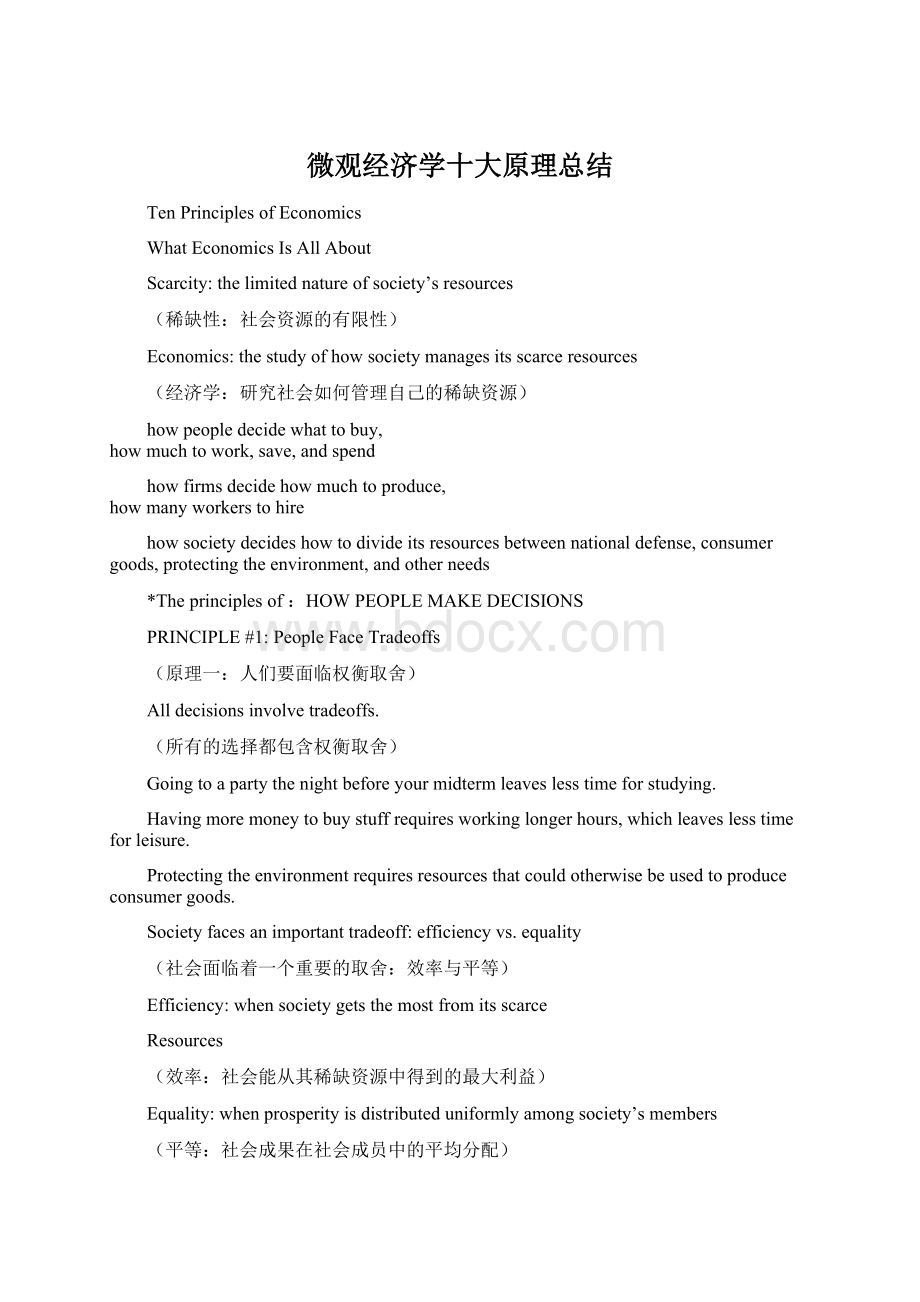 微观经济学十大原理总结文档格式.docx
微观经济学十大原理总结文档格式.docx
- 文档编号:17383733
- 上传时间:2022-12-01
- 格式:DOCX
- 页数:7
- 大小:19.46KB
微观经济学十大原理总结文档格式.docx
《微观经济学十大原理总结文档格式.docx》由会员分享,可在线阅读,更多相关《微观经济学十大原理总结文档格式.docx(7页珍藏版)》请在冰豆网上搜索。

Alldecisionsinvolvetradeoffs.
(所有的选择都包含权衡取舍)
Goingtoapartythenightbeforeyourmidtermleaveslesstimeforstudying.
Havingmoremoneytobuystuffrequiresworkinglongerhours,whichleaveslesstimeforleisure.
Protectingtheenvironmentrequiresresourcesthatcouldotherwisebeusedtoproduceconsumergoods.
Societyfacesanimportanttradeoff:
efficiencyvs.equality
(社会面临着一个重要的取舍:
效率与平等)
Efficiency:
whensocietygetsthemostfromitsscarce
Resources
(效率:
社会能从其稀缺资源中得到的最大利益)
Equality:
whenprosperityisdistributeduniformlyamongsociety’smembers
(平等:
社会成果在社会成员中的平均分配)
Tradeoff:
Toachievegreaterequality,couldredistributeincomefromwealthytopoor.Butthisreducesincentivetoworkandproduce,shrinksthesizeoftheeconomic“pie.”
(权衡取舍:
为了实现更好地平等,将收入从富人到穷人重新分配。
但是这会降低工作和生产的积极性,减小经济的蛋糕)
PRINCIPLE#2:
TheCostofSomethingIsWhatYouGiveUptoGetIt
(原理二:
某种东西的成本是为了得到它所放弃的东西)
Makingdecisionsrequirescomparingthecostsandbenefitsofalternativechoices.
(做出决策需要比较这些选择的成本与利益)
Theopportunitycostofanyitemiswhatevermustbegivenuptoobtainit
(一种东西的机会成本是为了得到这种东西所放弃的东西)
Itistherelevantcostfordecisionmaking
(这是决策的有关成本)
Examples:
Theopportunitycostof…
goingtocollegeforayearisnotjustthetuition,books,andfees,butalsotheforegonewages.
seeingamovieisnotjustthepriceoftheticket,butthevalueofthetimeyouspendinthetheater.
PRINCIPLE#3:
RationalPeopleThinkattheMargin
(原理三:
理性人考虑边际量)
Rationalpeople
systematicallyandpurposefullydothebesttheycantoachievetheirobjectives.
(有组织的和有目的地做到他们能达到他们目的的最好)
makedecisionsbyevaluatingcostsandbenefitsofmarginalchanges,incrementaladjustmentstoanexistingplan.
(作出决策通过评估边际改变的成本和利益,对于现有计划的增量调整)
marginalchanges:
smallincrementaladjustmentstoaplanofaction
(边际变动:
对行动计划的微小增量调整)
Whenastudentconsiderswhethertogotocollegeforanadditionalyear,hecomparesthefees&
foregonewagestotheextraincomehecouldearnwiththeextrayearofeducation.
Whenamanagerconsiderswhethertoincreaseoutput,shecomparesthecostoftheneededlaborandmaterialstotheextrarevenue.
PRINCIPLE#4:
PeopleRespondtoIncentives
(原理四:
人们会对激励做出反应)
Incentive:
somethingthatinducesapersontoact,.theprospectofarewardorpunishment
(激励:
引起人行动的东西,即前景的奖励或惩罚)
Rationalpeoplerespondtoincentives.
(理性的人对激励做出反应)
Whengaspricesrise,consumersbuymorehybridcarsandfewergasguzzlingSUVs.
Whencigarettetaxesincrease,teensmokingfalls.
HOWPEOPLEINTERACT
PRINCIPLE#5:
TradeCanMakeEveryoneBetterOff
(原理五:
贸易可以使每个人的状况都变得更好)
Ratherthanbeingself-sufficient,peoplecanspecializeinproducingonegoodorserviceandexchangeitforothergoods.
(不是自给自足的,人们可以为其他商品专门生产一种产品或服务和交流)
Countriesalsobenefitfromtradeandspecialization:
(国家也受益于贸易和专业化。
)
Getabetterpriceabroadforgoodstheyproduce
(他们所生产的商品在国外得到更好的价格)
Buyothergoodsmorecheaplyfromabroadthancouldbeproducedathome
(从国外购买其他商品比国内生产更便宜)
PRINCIPLE#6:
MarketsAreUsuallyAGoodWaytoOrganizeEconomicActivity
(市场通常是组织经济活动的一种好方法)
Market:
agroupofbuyersandsellers(neednotbeinasinglelocation)
(市场:
是一个由买者和卖者组成的群体)
“Organizeeconomicactivity”meansdetermining
whatgoodstoproduce
howtoproducethem
howmuchofeachtoproduce
whogetsthem
Amarketeconomyallocatesresourcesthroughthedecentralizeddecisionsofmanyhouseholdsandfirmsastheyinteractinmarkets.
(市场经济分配资源通过分散决策的许多家庭和公司作为它们之间的交互作用存在于市场。
FamousinsightbyAdamSmithin
TheWealthofNations(1776):
Eachofthesehouseholdsandfirmsactsasif“ledbyaninvisiblehand”topromotegeneraleconomicwell-being。
(每一个这样的家庭和公司的行为好像“受着一只看不见的手”,以推广一般社会福利。
Theinvisiblehandworksthroughthepricesystem:
(“无形之手”工作通过价格系统:
Theinteractionofbuyersandsellersdeterminesprices.
(买家和卖家的相互作用决定了价格)
Eachpricereflectsthegood’svaluetobuyersandthecostofproducingthegood.
(每一个价格反应出了产品对于买者的价值和生产产品的成本)
Pricesguideself-interestedhouseholdsandfirmstomakedecisionsthat,inmanycases,maximizesociety’seconomicwell-being.
(那些价格指南家庭和公司作出决定,在许多情况下,最大化了社会的经济福利。
PRINCIPLE#7:
GovernmentsCanSometimesImproveMarketOutcomes
(原理七:
政府有时可以改善市场结果)
Importantroleforgovernment:
enforcepropertyrights(withpolice,courts)
(政府的重要角色:
实施产权等)
Peoplearelessinclinedtowork,produce,invest,orpurchaseiflargeriskoftheirpropertybeingstolen
(如果自己的财产有很大的风险丢失,那么人们就不太倾向于工作、生产、投资或购买)
Marketfailure:
whenthemarketfailstoallocatesociety’sresourcesefficiently
(市场本身不能有效配置资源的情况)
Causesofmarketfailure:
Externalities:
whentheproductionorconsumptionofagoodaffectsbystanders.pollution)
(外部性:
当产品的生产与消费影响了旁观者。
例如:
污染)
Marketpower:
asinglebuyerorsellerhassubstantialinfluenceonmarketprice.monopoly)
(市场势力:
单个的买者或者卖者对市场价格有显着影响。
垄断)
Publicpolicymaypromoteefficiency
(公共政策能促进效率)
Governmentmayaltermarketoutcometopromoteequity.
(政府可能会改变市场结果促进平等。
Ifthemarket’sdistributionofeconomicwell-beingisnotdesirable,taxorwelfarepoliciescanchangehowtheeconomic“pie”isdivided。
(如果市场的经济上的福利分配不理想,税款或者社会福利政策能改变经济“馅饼”的分割)
*Theprinciplesof:
HOWTHEECONOMYASAWHOLEWORKS
(整体经济如何运行)
PRINCIPLE#8:
ACountry’sStandardofLivingDependsonItsAbilitytoProduceGoods&
Services
(原理八:
一国的生活水平取决于它生产物品与劳务的能力)
Hugevariationinlivingstandardsacrosscountriesandovertime:
(各个国家随着时间推移生活水平差异很大)
Averageincomeinrichcountriesismorethantentimesaverageincomeinpoorcountries.
(富裕国家的平均收入是贫穷国家的十倍)
The.standardoflivingtodayisabouteighttimeslargerthan100yearsago.
(今天美国的生活标准大约是100年前的八倍)
Themostimportantdeterminantoflivingstandards:
productivity,theamountofgoodsandservicesproducedperunitoflabor.
(最重要的决定性的生活标准:
生产力,商品的数量和劳务的单位劳动。
Productivitydependsontheequipment,skills,andtechnologyavailabletoworkers.
(生产力取决于设备、技术和可行的技术工人。
Otherfactors.,competitionfromabroad)havefarlessimpactonlivingstandards.
(其他因素(例如:
来自海外的竞争)较小影响人民的生活水平。
PRINCIPLE#9:
PricesRiseWhentheGovernmentPrintsTooMuchMoney
(原理九:
当政府发型了过多的货币时,物价上升)
Inflation:
increasesinthegenerallevelofprices.
(通货膨胀:
经济中物价总水平的上升)
Inthelongrun,inflationisalmostalwayscausedbyexcessivegrowthinthequantityofmoney,whichcausesthevalueofmoneytofall.
(从长期来看,通货膨胀是几乎总是由钱的数量的过度增长引起的,使钱的价值下跌。
Thefasterthegovtcreatesmoney,thegreatertheinflationrate.
(政府创造钱越快,通货膨胀率越大)
PRINCIPLE#10:
SocietyFacesaShort-runTradeoffBetweenInflationandUnemployment
(原理十:
社会面临通货膨胀和失业之间的短期权衡取舍)
Intheshort-run(1–2years),manyeconomicpoliciespushinflationandunemploymentinoppositedirections.
(在短期内,许多经济政策在反方向上推动了通货膨胀率和失业率)
Otherfactorscanmakethistradeoffmoreorlessfavorable,butthetradeoffisalwayspresent.
(其他的因素可以使这交易或多或少的优惠,但是权衡是永远存在。
SUMMARY:
Theprinciplesofdecisionmakingare:
Peoplefacetradeoffs.
(人们面临权衡取舍)
Thecostofanyactionismeasuredintermsofforegoneopportunities.
(任何行为的成本可以用其所放弃的机会来衡量)
Rationalpeoplemakedecisionsbycomparingmarginalcostsandmarginalbenefits.
(理性人通过比较边际成本与边际利益做出决策)
Peoplerespondtoincentives.
(人们对激励做出反应)
Theprinciplesofinteractionsamongpeopleare:
Tradecanbemutuallybeneficial.
Marketsareusuallyagoodwayofcoordinatingtrade.
(市场是协调经济活动的一种好方法)
Governmentcanpotentiallyimprovemarketoutcomesifthereisamarketfailureorifthemarketoutcomeisinequitable.
(政府可以潜在地改善市场结果)
Theprinciplesoftheeconomyasawholeare:
Productivityistheultimatesourceoflivingstandards.
(生产率是生活水平的最终根源)
Moneygrowthistheultimatesourceofinflation.
(货币的增长是通货膨胀的最终根源)
Societyfacesashort-runtradeoffbetweeninflationandunemployment.
(社会面临着通货膨胀与失业之间的短期权衡取舍)
- 配套讲稿:
如PPT文件的首页显示word图标,表示该PPT已包含配套word讲稿。双击word图标可打开word文档。
- 特殊限制:
部分文档作品中含有的国旗、国徽等图片,仅作为作品整体效果示例展示,禁止商用。设计者仅对作品中独创性部分享有著作权。
- 关 键 词:
- 微观经济学 原理 总结
 冰豆网所有资源均是用户自行上传分享,仅供网友学习交流,未经上传用户书面授权,请勿作他用。
冰豆网所有资源均是用户自行上传分享,仅供网友学习交流,未经上传用户书面授权,请勿作他用。


 如何打造酒店企业文化2刘田江doc.docx
如何打造酒店企业文化2刘田江doc.docx
